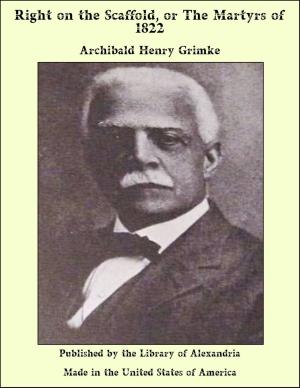| Author: | Mrs. Oliphant | ISBN: | 9781465575203 |
| Publisher: | Library of Alexandria | Publication: | March 8, 2015 |
| Imprint: | Language: | English |
| Author: | Mrs. Oliphant |
| ISBN: | 9781465575203 |
| Publisher: | Library of Alexandria |
| Publication: | March 8, 2015 |
| Imprint: | |
| Language: | English |
TOWARDS the west end of Grove Street, in Carlingford, on the shabby side of the street, stood a red brick building, presenting a pinched gable terminated by a curious little belfry, not intended for any bell, and looking not unlike a handle to lift up the edifice by to the public observation. This was Salem Chapel, the only Dissenting place of worship in Carlingford. It stood in a narrow strip of ground, just as the little houses which flanked it on either side stood in their gardens, except that the enclosure of the chapel was flowerless and sombre, and showed at the farther end a few sparsely-scattered tombstones—unmeaning slabs, such as the English mourner loves to inscribe his sorrow on. On either side of this little tabernacle were the humble houses—little detached boxes, each two storeys high, each fronted by a little flower-plot—clean, respectable, meagre, little habitations, which contributed most largely to the ranks of the congregation in the Chapel. The big houses opposite, which turned their backs and staircase windows to the street, took little notice of the humble Dissenting community. Twice in the winter, perhaps, the Miss Hemmings, mild evangelical women, on whom the late rector—the Low-Church rector, who reigned before the brief and exceptional incumbency of the Rev. Mr. Proctor—had bestowed much of his confidence, would cross the street, when other profitable occupations failed them, to hear a special sermon on a Sunday evening. But the Miss Hemmings were the only representatives of anything which could, by the utmost stretch, be called Society, who ever patronised the Dissenting interest in the town of Carlingford. Nobody from Grange Lane had ever been seen so much as in Grove Street on a Sunday, far less in the chapel. Greengrocers, dealers in cheese and bacon, milkmen, with some dressmakers of inferior pretensions, and teachers of day-schools of similar humble character, formed the élite of the congregation. It is not to be supposed, however, on this account, that a prevailing aspect of shabbiness was upon this little community; on the contrary, the grim pews of Salem Chapel blushed with bright colours, and contained both dresses and faces on the summer Sundays which the Church itself could scarcely have surpassed. Nor did those unadorned walls form a centre of asceticism and gloomy religiousness in the cheerful little town. Tea-meetings were not uncommon occurrences in Salem—tea-meetings which made the little tabernacle festive, in which cakes and oranges were diffused among the pews, and funny speeches made from the little platform underneath the pulpit, which woke the unconsecrated echoes with hearty outbreaks of laughter. Then the young people had their singing-class, at which they practised hymns, and did not despise a little flirtation; and charitable societies and missionary auxiliaries diversified the congregational routine, and kept up a brisk succession of “Chapel business,” mightily like the Church business which occupied Mr. Wentworth and his Sisters of Mercy at St.
TOWARDS the west end of Grove Street, in Carlingford, on the shabby side of the street, stood a red brick building, presenting a pinched gable terminated by a curious little belfry, not intended for any bell, and looking not unlike a handle to lift up the edifice by to the public observation. This was Salem Chapel, the only Dissenting place of worship in Carlingford. It stood in a narrow strip of ground, just as the little houses which flanked it on either side stood in their gardens, except that the enclosure of the chapel was flowerless and sombre, and showed at the farther end a few sparsely-scattered tombstones—unmeaning slabs, such as the English mourner loves to inscribe his sorrow on. On either side of this little tabernacle were the humble houses—little detached boxes, each two storeys high, each fronted by a little flower-plot—clean, respectable, meagre, little habitations, which contributed most largely to the ranks of the congregation in the Chapel. The big houses opposite, which turned their backs and staircase windows to the street, took little notice of the humble Dissenting community. Twice in the winter, perhaps, the Miss Hemmings, mild evangelical women, on whom the late rector—the Low-Church rector, who reigned before the brief and exceptional incumbency of the Rev. Mr. Proctor—had bestowed much of his confidence, would cross the street, when other profitable occupations failed them, to hear a special sermon on a Sunday evening. But the Miss Hemmings were the only representatives of anything which could, by the utmost stretch, be called Society, who ever patronised the Dissenting interest in the town of Carlingford. Nobody from Grange Lane had ever been seen so much as in Grove Street on a Sunday, far less in the chapel. Greengrocers, dealers in cheese and bacon, milkmen, with some dressmakers of inferior pretensions, and teachers of day-schools of similar humble character, formed the élite of the congregation. It is not to be supposed, however, on this account, that a prevailing aspect of shabbiness was upon this little community; on the contrary, the grim pews of Salem Chapel blushed with bright colours, and contained both dresses and faces on the summer Sundays which the Church itself could scarcely have surpassed. Nor did those unadorned walls form a centre of asceticism and gloomy religiousness in the cheerful little town. Tea-meetings were not uncommon occurrences in Salem—tea-meetings which made the little tabernacle festive, in which cakes and oranges were diffused among the pews, and funny speeches made from the little platform underneath the pulpit, which woke the unconsecrated echoes with hearty outbreaks of laughter. Then the young people had their singing-class, at which they practised hymns, and did not despise a little flirtation; and charitable societies and missionary auxiliaries diversified the congregational routine, and kept up a brisk succession of “Chapel business,” mightily like the Church business which occupied Mr. Wentworth and his Sisters of Mercy at St.















